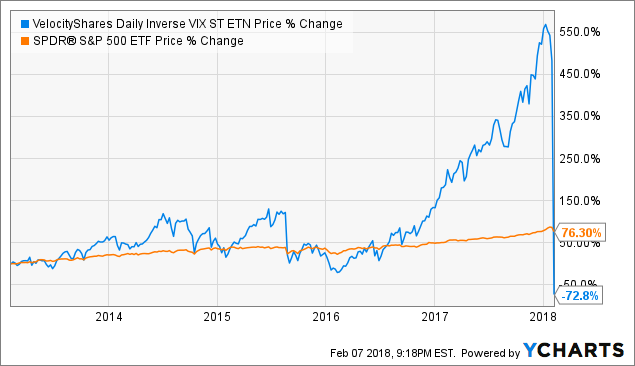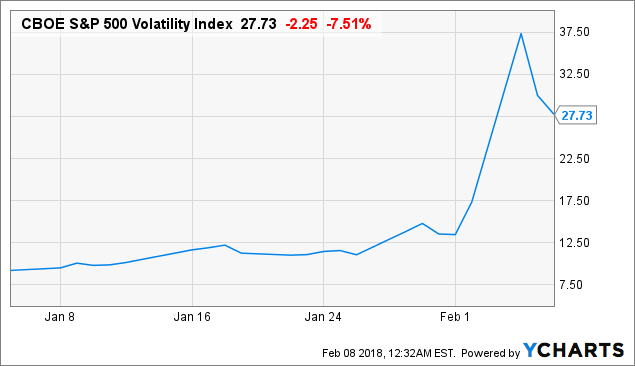[ad_1]
VelocityShares Daily Inverse VIX Short-Term ETN (XIV) suffered one of the most dramatic moves in the after markets on February 5. After losing 15% during regular trading hours, the fund lost an additional 96% of its value (based on NAV) in the after markets. The sponsor Credit Suisse announced the fund will be terminated at on February 20. That closes out the saga in a passive fund which until 5 days ago was beating the S&P 500 index by the most audacious margin.

XIV data by YCharts
What XIV did
As the name implies the fund was created to “short” the volatility or “fear” index. Because of the nature of the index, it is almost always in a state of steep contango, where prices of future months are significantly higher than current. This creates a negative “roll” on this index and shorting it has been a very profitable strategy.
What changed
Most people are aware that shorting a product limits your maximum profit to 100% of your invested product. The converse kind off applies here whereby a single day of 100% move in the index would wipe out the note. Here, with everyone and their brother short volatility the setting was there for a vicious spike. And it happened.

^VIX data by YCharts
The CBOE volatility index jumped from 12.50 to 37.5 in a matter of days, with a doubling happening on February 5. We are sure there was an extreme cascading impact as leveraged funds short had to cover and leveraged funds long actually increased VIX exposure. The move was so out of sync with the markets that VIX spike implied a drop in the S&P 500 index approximately 4 times the actual drop!
How this changes things going forward
With XIV set for redemption and its notional exposure now less than 7% what it was previously, another such spike is less likely. What is also less likely is creating another such product immediately. Hence the passive shorting of volatility is going to be a lot less popular product among retail investors. Shorting iPath S&P 500 VIX Short-Term Futures ETN (VXX) remains an alternative for now but far fewer retail investors are comfortable with shorting a stock as they were with getting long a stock. Brokerages too are penalizing investors for being involved with these products, primarily to protect their posteriors.
Hedge funds too have gotten slammed with one fund down 65% overnight.
One of Man Group Plc’s main funds plunged on Monday as market trends suddenly reversed, according to a person with knowledge of the matter. Option Solutions LLC, a hedge-fund that trades equity options, lost as much as 65 percent after it was forced to sell holdings overnight.
“Traders who were short volatility just had to puke,” said Tobias Hekster, co-chief investment officer at True Partner Advisor, who was speaking in general ahead of trade opening in the U.S. on Tuesday. “And our expectation is we’re not done yet.”
This is going to force funds to reexamine this popular shorting strategy with much tighter controls or AUM linked to such tactics. Additionally, investors could actually chase the ghost of recent past and go long volatility products hoping for a reversal. While the volatility index is a product of a complex calculation on the value of options, here the tail can definitely wag the dog in our opinion. So going forward we expect a higher level of volatility for the same conditions as one volatility suppressing tool will be absent (retail and hedge fund shorts).
Why this is good news
We see this as empirically good news for two reasons. First we expect the blowout of this magnitude has removed one source of tail risk in the market as volatility shorts have been roasted. Second and more importantly, the XIV type of funds by deliberating shorting and in our opinion artificially lowering volatility, were robbing returns from another class of investors, the covered call and cash-secured put sellers. Remember, the price of an option has an implied volatility content and a lower VIX, all other things being equal, meant a lower option price.
An elevated level of volatility will benefit this professional class of option writers (ourselves included). This is similar to what happens when a natural disaster wipes out the smaller insurers and the remaining large players make more money by raising their premiums. Option writers can now do that, i.e. raise their premiums. This will boost total return/yield on covered calls or cash secured puts significantly. Coupled with the recent sell-off in high yielding securities it makes getting 15-20%+ 1 year yields with either strategy relatively easy. Of course to earn that yield, prices have to stay flat, something that seems hard to fathom right now, but that is precisely why they yield so much. This will also benefit funds that sell options like the InfraCap MLP ETF (AMZA). How long will this last? Well that depends on whether Wall Street finds itself running back to this well again or not. CBOE (CBOE) CEO was forced to defend VIX products just yesterday.
Monday’s volatility shock in U.S. stock markets had led to some misconceptions about the Cboe Volatility Index, known as the VIX .VIX, and related exchange-traded products (ETPs), Cboe’s Tilly said.
“The market drop caused a spike in realized volatility and in turn risk was repriced. It’s important to note that products linked to volatility do not cause volatility,” he said.
Tilly was speaking on a conference call hosted by Cboe to address concerns around market volatility in the aftermath of Monday’s historic hit to stocks.
We do not share his view as we do think the multitude of passive products did create or at least exacerbate the spike. So do many others. Hence we think that it will be some time before the product creators go down this street again with vigour. In the interim, rejoice the new (relatively) higher volatility regime.
Disclosure: I/we have no positions in any stocks mentioned, and no plans to initiate any positions within the next 72 hours.
I wrote this article myself, and it expresses my own opinions. I am not receiving compensation for it (other than from Seeking Alpha). I have no business relationship with any company whose stock is mentioned in this article.
Additional disclosure: By having cash secured puts or covered calls in our portfolio, we are “short” volatility indirectly.
[ad_2]
Source link













